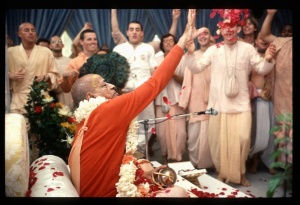CC Antya 8.67-68: Difference between revisions
m (1 revision(s)) |
No edit summary |
||
| Line 1: | Line 1: | ||
{{ | [[Category:Sri Caitanya-caritamrta - Antya-lila Chapter 08]] | ||
<div style="float:left">'''[[Sri Caitanya-caritamrta|Śrī Caitanya-caritāmṛta]] - [[CC Antya|Antya-līlā]] - [[CC Antya 8|Chapter 8: Rāmacandra Purī Criticizes the Lord]]'''</div> | |||
<div style="float:right">[[File:Go-previous.png|link=CC Antya 8.66|Antya-līlā 8.66]] '''[[CC Antya 8.66|Antya-līlā 8.66]] - [[CC Antya 8.69|Antya-līlā 8.69]]''' [[File:Go-next.png|link=CC Antya 8.69|Antya-līlā 8.69]]</div> | |||
{{CompareVersions|CC|Antya 8.67-68|CC 1975|CC 1996}} | |||
{{RandomImage}} | |||
==== TEXTS 67-68 ==== | ==== TEXTS 67-68 ==== | ||
<div | <div class="verse"> | ||
nāty-aśnato | :nāty-aśnato 'pi yogo 'sti | ||
na caikāntam anaśnataḥ | :na caikāntam anaśnataḥ | ||
na cāti-svapna-śīlasya | :na cāti-svapna-śīlasya | ||
jāgrato naiva cārjuna | :jāgrato naiva cārjuna | ||
yuktāhāra-vihārasya | :yuktāhāra-vihārasya | ||
yukta-ceṣṭasya karmasu | :yukta-ceṣṭasya karmasu | ||
yukta-svapnāvabodhasya | :yukta-svapnāvabodhasya | ||
yogo bhavati duḥkha- | :yogo bhavati duḥkha-hā" | ||
</div> | </div> | ||
| Line 18: | Line 22: | ||
==== SYNONYMS ==== | ==== SYNONYMS ==== | ||
<div | <div class="synonyms"> | ||
''na''—not; ''ati-aśnataḥ''—of one who eats too much; ''api''—certainly; ''yogaḥ''—linking with the Supreme; ''asti''—there is; ''na''—not; ''ca''—also; ''ekāntam''—solely; ''anaśnataḥ''—of one who abstains from eating; ''na''—not; ''ca''—also; ''ati-svapna-śīlasya''—of one who dreams too much in sleep; ''jāgrataḥ''—of one who keeps awake; ''na''—not; ''eva''—certainly; ''ca''—also; ''arjuna''—O Arjuna; ''yukta''—as much as necessary; ''āhāra''—eating; ''vihārasya''—of one whose sense enjoyment; ''yukta''—proper; ''ceṣṭasya''—of one whose endeavor; ''karmasu''—in executing duties; ''yukta''—as much as necessary; ''svapna''—dreaming while asleep; ''avabodhasya''—of one whose keeping awake; ''yogaḥ''—practice of ''yoga''; ''bhavati''—is; ''duḥkha-hā''—diminishing sufferings. | |||
</div> | </div> | ||
| Line 25: | Line 29: | ||
==== TRANSLATION ==== | ==== TRANSLATION ==== | ||
<div | <div class="translation"> | ||
"[Lord Kṛṣṇa said:] 'My dear Arjuna, one cannot perform mystic yoga if he eats more than necessary or needlessly fasts, sleeps and dreams too much or does not sleep enough. One should eat and enjoy his senses as much as necessary, one should properly endeavor to execute his duties, and one should regulate his sleep and wakefulness. Thus one can become freed from material pains by executing mystic yoga.'" | |||
</div> | </div> | ||
| Line 32: | Line 36: | ||
==== PURPORT ==== | ==== PURPORT ==== | ||
<div | <div class="purport"> | ||
This is a quotation from the Bhagavad-gītā ([[BG 6.16-17]]). | This is a quotation from the [[Bhagavad-gita As It Is (1972)|''Bhagavad-gītā'']] ([[BG 6.16 (1972)|BG 6.16-17]]). | ||
</div> | </div> | ||
__NOTOC__ | |||
<div style="float:right; clear:both;">[[File:Go-previous.png|link=CC Antya 8.66|Antya-līlā 8.66]] '''[[CC Antya 8.66|Antya-līlā 8.66]] - [[CC Antya 8.69|Antya-līlā 8.69]]''' [[File:Go-next.png|link=CC Antya 8.69|Antya-līlā 8.69]]</div> | |||
__NOTOC__ | |||
__NOEDITSECTION__ | |||
Revision as of 08:26, 21 September 2021

A.C. Bhaktivedanta Swami Prabhupada
TEXTS 67-68
- nāty-aśnato 'pi yogo 'sti
- na caikāntam anaśnataḥ
- na cāti-svapna-śīlasya
- jāgrato naiva cārjuna
- yuktāhāra-vihārasya
- yukta-ceṣṭasya karmasu
- yukta-svapnāvabodhasya
- yogo bhavati duḥkha-hā"
SYNONYMS
na—not; ati-aśnataḥ—of one who eats too much; api—certainly; yogaḥ—linking with the Supreme; asti—there is; na—not; ca—also; ekāntam—solely; anaśnataḥ—of one who abstains from eating; na—not; ca—also; ati-svapna-śīlasya—of one who dreams too much in sleep; jāgrataḥ—of one who keeps awake; na—not; eva—certainly; ca—also; arjuna—O Arjuna; yukta—as much as necessary; āhāra—eating; vihārasya—of one whose sense enjoyment; yukta—proper; ceṣṭasya—of one whose endeavor; karmasu—in executing duties; yukta—as much as necessary; svapna—dreaming while asleep; avabodhasya—of one whose keeping awake; yogaḥ—practice of yoga; bhavati—is; duḥkha-hā—diminishing sufferings.
TRANSLATION
"[Lord Kṛṣṇa said:] 'My dear Arjuna, one cannot perform mystic yoga if he eats more than necessary or needlessly fasts, sleeps and dreams too much or does not sleep enough. One should eat and enjoy his senses as much as necessary, one should properly endeavor to execute his duties, and one should regulate his sleep and wakefulness. Thus one can become freed from material pains by executing mystic yoga.'"
PURPORT
This is a quotation from the Bhagavad-gītā (BG 6.16-17).